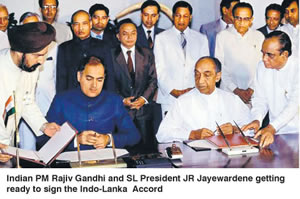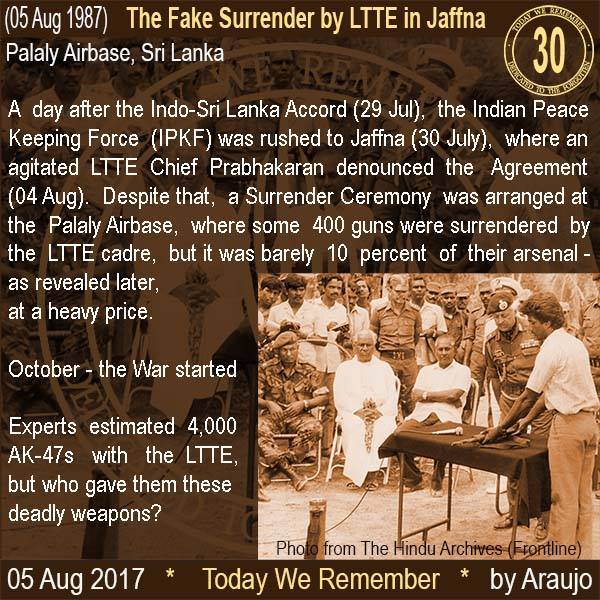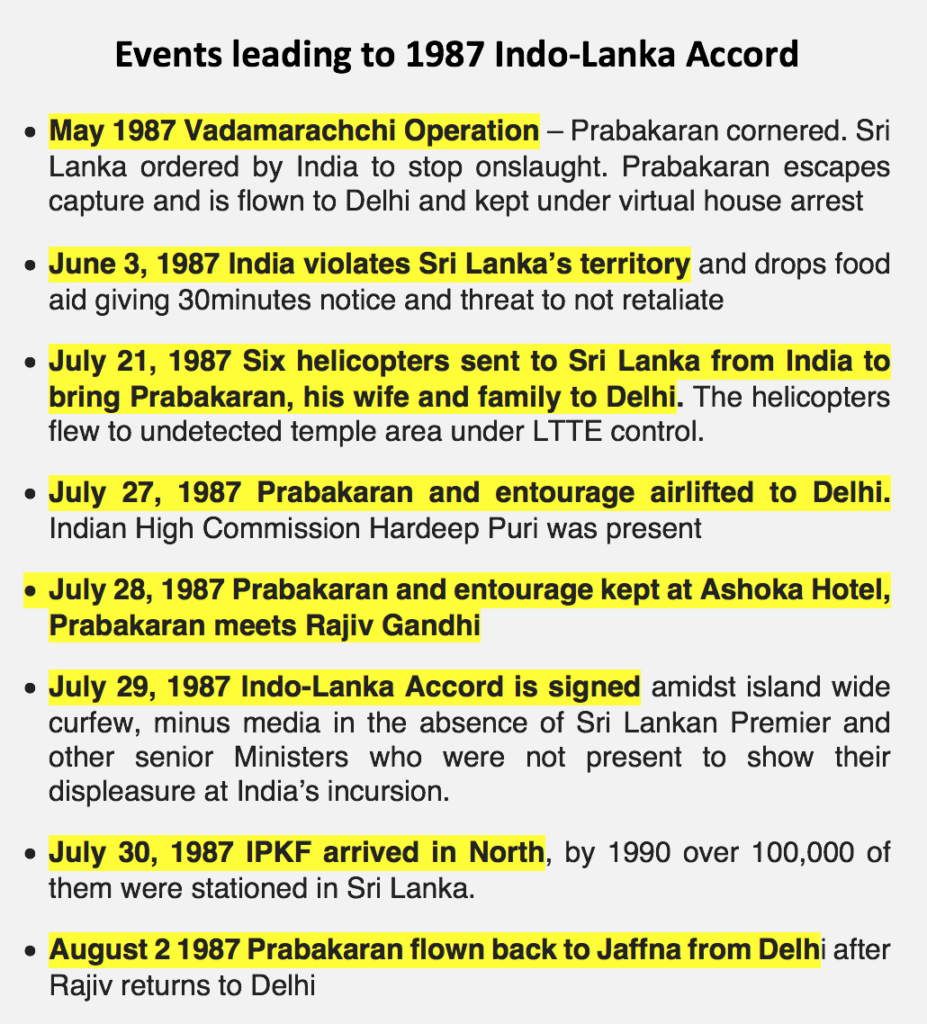If Nicaragua could take US to international court & win – shouldn’t Sri Lanka do same to India?

In April 1984 Nicaragua referred the US Government to the International Court of Justice claiming the US violated international law by supporting the Contras. The ICJ ruled in favor of Nicaragua in 1986 & demanded reparations be paid to Nicaragua. The US did not participate in the court proceedings. The US also blocked enforcement of the judgement & thus prevented giving compensation. India’s role and interference in Sri Lanka is well documented and one that demands Sri Lanka should officially put India’s interventions internationally – seek apology & reparations too.
The ICJ held that the US was
- ‘in breach of its obligations under customary international law not to use force against another State’
- “not to intervene in its affairs”
- “not to violate its sovereignty”
- “not to interrupt peaceful maritime commerce”
- “in breach of its obligations under Article XiX of the Treaty of Friendship, Commerce & Navigation between the Parties signed in 1956.
The US intervention in Nicaragua goes back to early 1909s. Background reading on the Contras, Oliver North and various US administrations will reveal much.
The case in point & what Sri Lanka can take note of from the charges filed by Nicaragua against the US was that the US was “recruiting, training, arming, equipping, financing, supplying and otherwise encouraging, supporting, aiding & directing military and paramilitary actions in and against Nicaragua” – was this not what India was doing to Sri Lanka via Tamil militant groups that India created. Jain Commission report even gives the locations of where India trained these Sri Lankan Tamil groups.
Nicaragua accuses US of violating international Treaty Obligations:
- Article 2(4) of the UN Charter
- Article 18 & 20 of the Charter of the Organization of American States
- Article 8 of the Convention on the Rights & Duties of States
- Article 1, 3 of the Convention concerning the Duties & Rights of States in the Event of Civil Strife
- US breached customary international law by
- Violating the sovereignty of Nicaragua – armed attacks against Nicaragua by air, land & sea, incursions into Nicaraguan territorial waters, aerial trespass into Nicaraguan airspace, direct & indirect coercions & intimidations
- Using force & threat of force against Nicaragua
- Intervening in internal affairs of Nicaragua
- Infringing the freedom of the high seas & interrupting peaceful maritime commerce
- Killing, wounding & kidnapping citizens of Nicargua
These allegations, immediately call to mind how India forced the signing of the Indo-Lanka Accord in 1987. A call to the Sri Lankan envoy in Delhi with a subtle threat to not take action, the violation of Sri Lanka’s air with the infamous parippu drop, carrying Prabakaran & family to India by helicopter, the many Sri Lankans raped & killed by Indian Peace Keepers, the violation to Sri Lanka’s marine bed using internationally banned bottom trawlers, the stealing of Sri Lanka’s fish, the illegal immigrants, the interference in Sri Lanka’s internal affairs – the list goes on.
https://www.youtube.com/watch?v=65fYGfZRBvY



What is noteworthy is that while the US put forward arguments against the judgement of the Court, the countries that sided with US did not challenge the Courts judgement, its findings or the merit of the case. Undoubtedly, all of India’s neighbors will side with Sri Lanka, as these countries have all been victims of India’s intervention too.
The judgement listed 291 points that US was involved in ‘unlawful use of force’ – how many points can Sri Lanka list of India’s interventions in Sri Lanka’s internal affairs using ‘unlawful use of force’?
We can recall the upteen times our officials had to virtually fly every week to Delhi to brief the Indians of the progress of Sri Lanka’s military/humanitarian cause in 2009.Why did Sri Lanka have to report to India, if we are a sovereign nation?
What is poignant is that the Court concluded that even though US made its objections, US was subject to the Court’s jurisdiction.
In November 1986, the UNGA passed a non-binding resolution (94-3 against – El Salvador, Israel & US) urging US to comply with the 27 June 1986 Court ruling.
Points that the judgement gave against US is relevant to India’s interference & interventions in Sri Lanka (past and present/ongoing)
The Court rejected US justification of collective self-defense – this is similar ot the eternal parroting by India justifying interference in Sri Lanka to maintain India’s security concerns! When by the very assistance to Sri Lankan Armed groups, India has virtually invited and opened its borders for its own balkanization by this act.
Just as the Court found US guilty of training, arming, equipping, financing & suppling the Contras against Nicaragua – India by its own self-admissions via Indian diplomats, Indian military personnel, Indian journalists etc self-confess to arming LTTE and other Sri Lankan armed groups since 1970s as documented even by foreign think tanks like Council of Foreign Relations. https://www.cfr.org/backgrounder/sri-lankan-conflict(India’s Role in the Conflict)
If US was found guilty of violating the principles of non-intervention, India has to be guilty of doing same. Not only did India train, arm, financially assist LTTE & other armed groups, India even exerted pressure to amend Sri Lanka’s constitution bringing the 13thamendment and creating the headache of Provincial Council system. India continues to use diplomatic force to demand full implementation of the clauses of this agreement which India wishes to turn to its political advantage.
India forced the signing of the Indo-Lanka Accord which rested on India committing to deliver 5key clauses – which India has failed to commit. This automatically places the Accord null & void. Under the principle of International Law ‘Pacta Sunt Servanda’ (agreements must be kept) both parties must execute their mutually agreed obligations in good faith. India breached its obligations under the Accord.
The Indo-Lanka Accord was signed on 29 July 1987 in Colombo under emergency while the 13thAmendment to Sri Lanka’s constitution was passed on 14 November 1987. There is no word in the Indo-Lanka Accord that mentions amending Sri Lanka’s Constitution. The Accord makes no mention of ‘devolution’ either. There is no mention of devolution in the exchange of letters between Indian PM Rajiv Gandhi or Sri Lankan President JR Jayawardena. Their letters & the Indo-Lanka Accord only speak of the North East provinces & a system for these 2 provinces only. How did 13thamendment come about? Given that 13a is now part of Sri Lanka’s constitution, India has no right to add, remove or amend any of its clauses!
India violated Sri Lanka’s airspace with the parippu drop. India threatened Sri Lanka if we took action against India’s interventions. India rescued a terrorist and flew him & family out of Sri Lanka to Delhi where Indian PM presented this terrorist with his own bullet proof vest! India armed 35 militant groups of which LTTE became supreme virtually killing off the other leaders. Indian peace keepers killed and raped Sri Lankans, documented by LTTE itself. India trained an armed group to be headed by their poodle Varatharaja Perumal (Tamil National Army) – isn’t it ironic TNA has become Tamil National Alliance parroting what India & West wants! The use of internationally banned bottom trawlers that ruin our marine bed, marine environment and livelihood of our fishermen is a violation of Sri Lanka’s territorial waters but a marine crime as well. The influx of illegal immigrants is also a topic that needs to be taken to the table. The manner that India uses Tamils as a guineapig to exert its political will is a factor that has resulted in unnecessary tensions amongst communities. The manner India has used its powers to exert its will culturally, economically via cheap goods and manipulation of trade agreements is also a topic to debate.
Sri Lanka cannot progress primarily as a result of India feeling that India must give the nod of approval for every internal decision any Sri Lankan government makes. Even the UNHRC Resolutions by West/EU bloc came only after India’s nod of approval as did the 2002 Norwegian brokered CFA.
Sri Lanka, can come up with 101 policy papers and templates, but none of these nicely documented colourful blueprints will see light of day, if our politicians and advisors run with these documents and expect a pat on the back from India before implementing or a cut and chop if India objects!
Look at the disaster of allocating key assets for development – how can we progress if we work on mathematics that claim – if we give x, we must give y even if y has no plans to do any development and wish to only embrace it and prevent it from developing. Isnt this going to be the story of Colombo’s Western Terminal?
Unfortunately, there are some in Sri Lanka who think because of the Buddhist link Sri Lanka must remain eternally grateful to India. Siddartha was born in Nepal. There was no India. India has a history of 74 years having been christened “India” in 1947 by the colonial British amalgamating independent states & territories. India is making use of Buddhism as a soft tool to gain footprint in Asia as a political tool. However, some in in Sri Lanka think they must run to India and seek its approval without realizing Sri Lanka is a sovereign state capable of making its own decisions. If Cuba can stand up to the self-righteous global bully US, why can’t Sri Lanka do the same with India?
Nicaragua may not have got compensation but it won a moral victory and the example set by Nicaragua is certainly one that Sri Lanka should take against India. Whatever friendships Sri Lanka offers to India or however Sri Lankans and Indian people are close at personal levels, India’s political framework & intel are only interested in destabilizing Sri Lanka.
Shenali D Waduge







